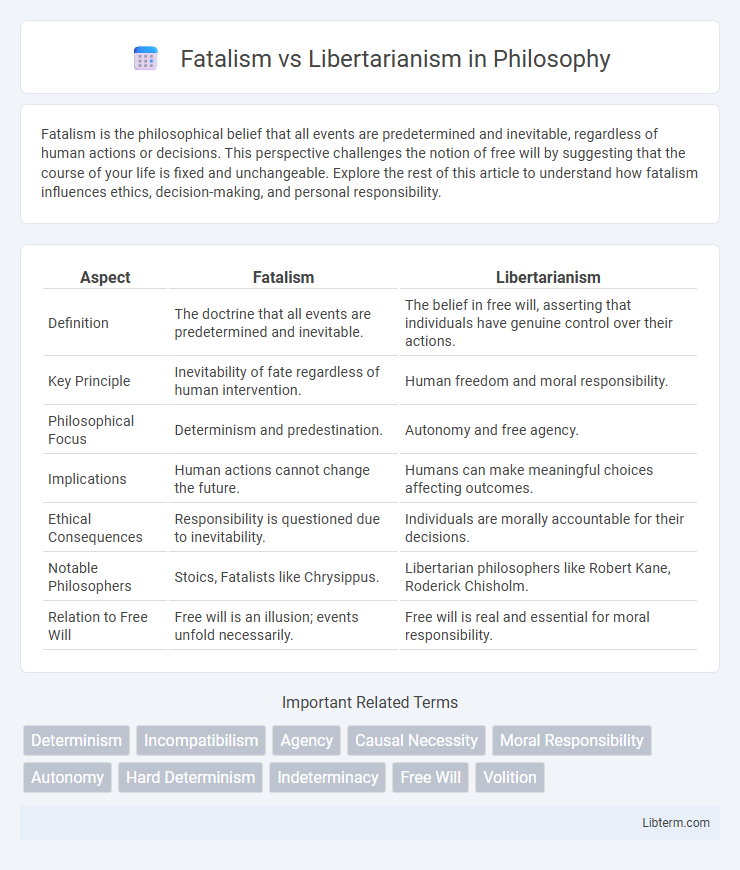Fatalism is the philosophical belief that all events are predetermined and inevitable, regardless of human actions or decisions. This perspective challenges the notion of free will by suggesting that the course of your life is fixed and unchangeable. Explore the rest of this article to understand how fatalism influences ethics, decision-making, and personal responsibility.
Table of Comparison
| Aspect | Fatalism | Libertarianism |
|---|---|---|
| Definition | The doctrine that all events are predetermined and inevitable. | The belief in free will, asserting that individuals have genuine control over their actions. |
| Key Principle | Inevitability of fate regardless of human intervention. | Human freedom and moral responsibility. |
| Philosophical Focus | Determinism and predestination. | Autonomy and free agency. |
| Implications | Human actions cannot change the future. | Humans can make meaningful choices affecting outcomes. |
| Ethical Consequences | Responsibility is questioned due to inevitability. | Individuals are morally accountable for their decisions. |
| Notable Philosophers | Stoics, Fatalists like Chrysippus. | Libertarian philosophers like Robert Kane, Roderick Chisholm. |
| Relation to Free Will | Free will is an illusion; events unfold necessarily. | Free will is real and essential for moral responsibility. |
Understanding Fatalism: Definition and Core Beliefs
Fatalism is the philosophical doctrine that events are predetermined and inevitable, rendering human free will an illusion. It asserts that all outcomes are fixed by fate, regardless of individual actions or choices. Core beliefs in fatalism emphasize acceptance of destiny, where the past, present, and future are interconnected and unalterable.
Defining Libertarianism: Principles of Free Will
Libertarianism asserts that individuals possess genuine free will, enabling them to make choices independent of deterministic forces or fate. This philosophical stance emphasizes moral responsibility founded on the capacity for self-determined decisions, rejecting fatalistic inevitability. Key principles include autonomy, agent causation, and the belief that human actions are not preordained by prior events.
Historical Roots: Origins of Fatalism and Libertarianism
Fatalism traces its origins to ancient Stoic philosophy, emphasizing the inevitability of events determined by fate or divine will. Libertarianism emerged from Enlightenment thinkers like John Locke and Jean-Jacques Rousseau, advocating for free will and individual autonomy against deterministic views. Both philosophies have shaped debates on human agency, ethics, and metaphysics throughout history.
Key Philosophers: Influential Thinkers in Both Camps
Fatalism finds its roots in the works of ancient Stoics like Chrysippus, who argued that all events are predetermined by a rational cosmic order, while philosophers such as Pierre-Simon Laplace championed scientific determinism reflecting fatalistic views. Libertarianism, emphasizing free will and moral responsibility, is notably represented by thinkers like Jean-Paul Sartre, who advocated existential freedom, and Robert Kane, a contemporary philosopher who developed influential theories on agent causation and indeterminism. The debate between these camps centers on whether human actions are preordained or freely chosen, shaping core discussions in metaphysics and ethics.
Contrasting Worldviews: Determinism vs Free Agency
Fatalism asserts that all events are predetermined and inevitable, denying genuine free agency and implying a fixed future regardless of individual actions. Libertarianism champions free agency, emphasizing that humans possess genuine freedom to make choices independent of deterministic forces. This fundamental contrast highlights determinism's inevitability against libertarianism's belief in autonomous moral responsibility.
Impacts on Morality and Ethics
Fatalism challenges the foundation of moral responsibility by asserting that all events, including human actions, are predetermined and inevitable, thus potentially undermining personal accountability and ethical judgment. Libertarianism, in contrast, upholds free will, emphasizing that individuals have genuine choice and control over their actions, which reinforces the basis for moral praise and blame. The divergence between these views significantly affects ethical theories, with fatalism often leading to deterministic ethics and libertarianism supporting theories that rely on autonomous moral agency.
Real-World Implications: Fate or Freedom in Daily Life
Fatalism posits that all events are predetermined, influencing individuals to accept circumstances without resistance, which can impact motivation and decision-making in daily life by fostering resignation. Libertarianism, emphasizing free will, encourages personal responsibility and proactive choices, promoting empowerment and accountability in shaping one's future. These opposing views affect how people approach challenges, make ethical decisions, and perceive their capacity for change in real-world scenarios.
Criticisms and Counterarguments
Fatalism faces criticism for undermining moral responsibility by suggesting outcomes are predetermined regardless of human actions, which conflicts with everyday experiences of choice and consequence. Libertarianism is challenged for its reliance on indeterministic free will, as critics argue quantum randomness does not equate to meaningful freedom or control over decisions. Counterarguments defend fatalism by emphasizing its coherence with determinism and objective reality, while supporters of libertarianism highlight the necessity of free will for moral accountability and the authenticity of human agency.
Modern Perspectives: Fatalism and Libertarianism Today
Modern perspectives on fatalism emphasize deterministic interpretations of quantum mechanics and neuroscience, suggesting human decisions may be predetermined by prior states of the universe. Libertarianism in contemporary philosophy advocates for genuine free will, arguing that moral responsibility requires agents to have control over their choices independent of causal determinism. Emerging debates often focus on compatibilist approaches, attempting to reconcile deterministic scientific findings with the libertarian notion of free agency.
Bridging the Divide: Is Reconciliation Possible?
Fatalism posits that all events are predetermined and inevitable, while libertarianism asserts the existence of free will and moral responsibility, creating a fundamental philosophical divide. Bridging this divide involves exploring compatibilist perspectives that reinterpret free will within predetermined frameworks or reconsidering the nature of causality and agency. Ongoing debates in metaphysics and cognitive science suggest that reconciliation may be possible by reframing concepts of freedom and determinism rather than insisting on their absolute opposition.
Fatalism Infographic

 libterm.com
libterm.com